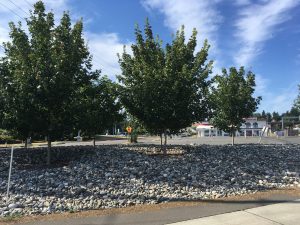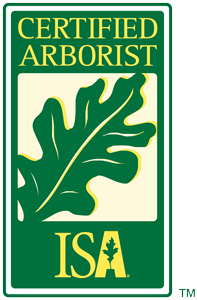Returning from a Seattle soccer tournament last weekend, I had time to examine the border landscaping while I waited in line. It was an early summer evening and I was relaxed because I didn’t have anything to declare. I literally spent four days near soccer fields watching my son take his U12 team to the finals.
Perfect fit mulch
To my left was a row of red maples (Acer rubrum) planted in river rock beds. Aha! Another perfect fit.
Now, personally I prefer organic mulches like arbor chips or composted bark. However, river rock can be perfect in some situations. I’ve already written blog posts about river rock as replacement for dog urine soaked lawn patches; and river rock as a solution for small dirt patches where new plants get flattened by car tires or, left bare, the dirt patches just grow weeds.
When you apply a nice, thick layer of mulch it keeps weeds out and doesn’t require any extra maintenance.
Now, back to our picture.
A. The river rock is correctly kept away from the critical root zone so water and oxygen can be accessed by the tree roots. The tree well also “captures” leaves and, assuming they’re left in place, allows them to feed the tree.
B. The river rock looks nice and thick. Thickness is important when applying mulches because we need to block out sunlight so weeds don’t germinate. Thin mulch applications can actually encourage weed growth because they trap moisture and allow sunlight to penetrate. Go deep or don’t do it all.
C. There are weeds visible in the edges which is to be expected. Wind and birds can import weed seeds.
D. River rock eliminates the need for lawn maintenance. This eliminates extra costs and protects cars lined up at the border. It would be stressful mowing and line edging near so many car windows. And, I suspect, the people lined up in their cars appreciate the complete lack of noise and air pollution.
Yes, you can use river rock as mulch. And, in some situations, it works better than organic mulches. Give it a try.





